To craft an effective social media marketing strategy for hotels, establishments must prioritize five essential steps:
By tailoring strategies to each platform and leveraging user-generated content, hotels can significantly enhance their visibility and drive bookings. Furthermore, statistics indicate that a substantial percentage of travelers are influenced by social media in their destination choices, underscoring the necessity of a well-structured approach.
Crafting a robust social media marketing strategy is no longer optional for hotels aiming to thrive in a competitive landscape. In an era where platforms like Instagram and TikTok are reshaping how travelers discover and engage with accommodations, hotels have a unique opportunity to enhance their visibility and drive bookings through tailored content. However, as the digital landscape evolves, how can hotels effectively navigate these changes and ensure their strategies resonate with the right audience? This guide delves into the essential steps for developing an impactful social media marketing approach that not only attracts guests but also fosters lasting connections.
The social media marketing strategy for hotels represents a dynamic approach that leverages platforms such as Facebook, Instagram, and Twitter to enhance brand visibility, engage with guests, and boost bookings. This approach necessitates the creation of compelling content that resonates with your target audience, the effective use of paid advertising, and the cultivation of community engagement. Understanding the demographics of each platform is essential; for instance, , where 75% of users are aged 18-24, is ideal for showcasing breathtaking visuals of your property, while Facebook excels in promoting events and facilitating direct customer interactions.
Effective online campaigns within the hospitality sector consistently underline the importance of authenticity and interaction. Influencer marketing, for example, has proven to be a formidable tool, generating an impressive $6.50 in revenue for every dollar spent, with 88% of consumers influenced by online creators in their purchasing decisions. This trend underscores the need for accommodations to partner with micro-influencers, who tend to drive higher engagement rates compared to their macro counterparts.
Furthermore, the emergence of platforms like TikTok, where Gen Z and Millennials often seek travel options, indicates a significant shift in consumer behavior. Hotels must adapt their marketing strategies to integrate these platforms, as 75% of travelers report that online networks have impacted their choice of destination. By crafting engaging content that tells a story, accommodations can successfully attract the attention of potential guests.
Experts in hospitality marketing emphasize the necessity for accommodations to invest time and resources into a social media marketing strategy for hotels. As Alyssa Foriska notes, implementing a social media marketing strategy for hotels is vital for capturing leads throughout the sales funnel and converting prospects into paying customers. By recognizing the unique characteristics of each platform and tailoring content accordingly, accommodations can refine their marketing efforts and ultimately increase bookings.
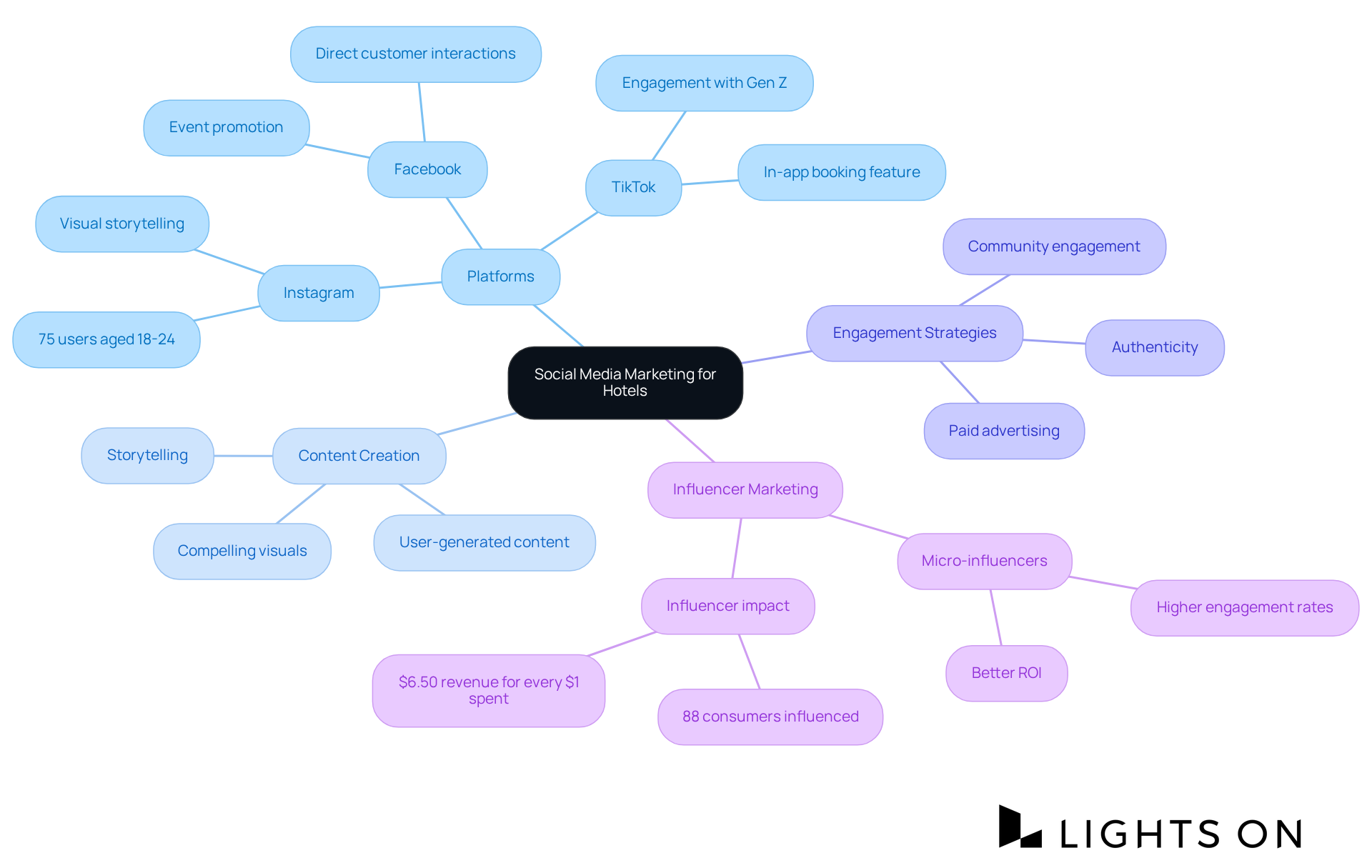
A social media marketing strategy for hotels serves as a crucial resource in the hospitality sector, enabling establishments to engage with prospective guests in real-time. To harness its full potential, hotels should implement a social media marketing strategy for hotels that includes:
Recent statistics reveal that:
By implementing these strategies, hotels can not only improve visibility but also increase direct reservations, highlighting the importance of a social media marketing strategy for hotels as an indispensable resource for success in the hospitality industry.
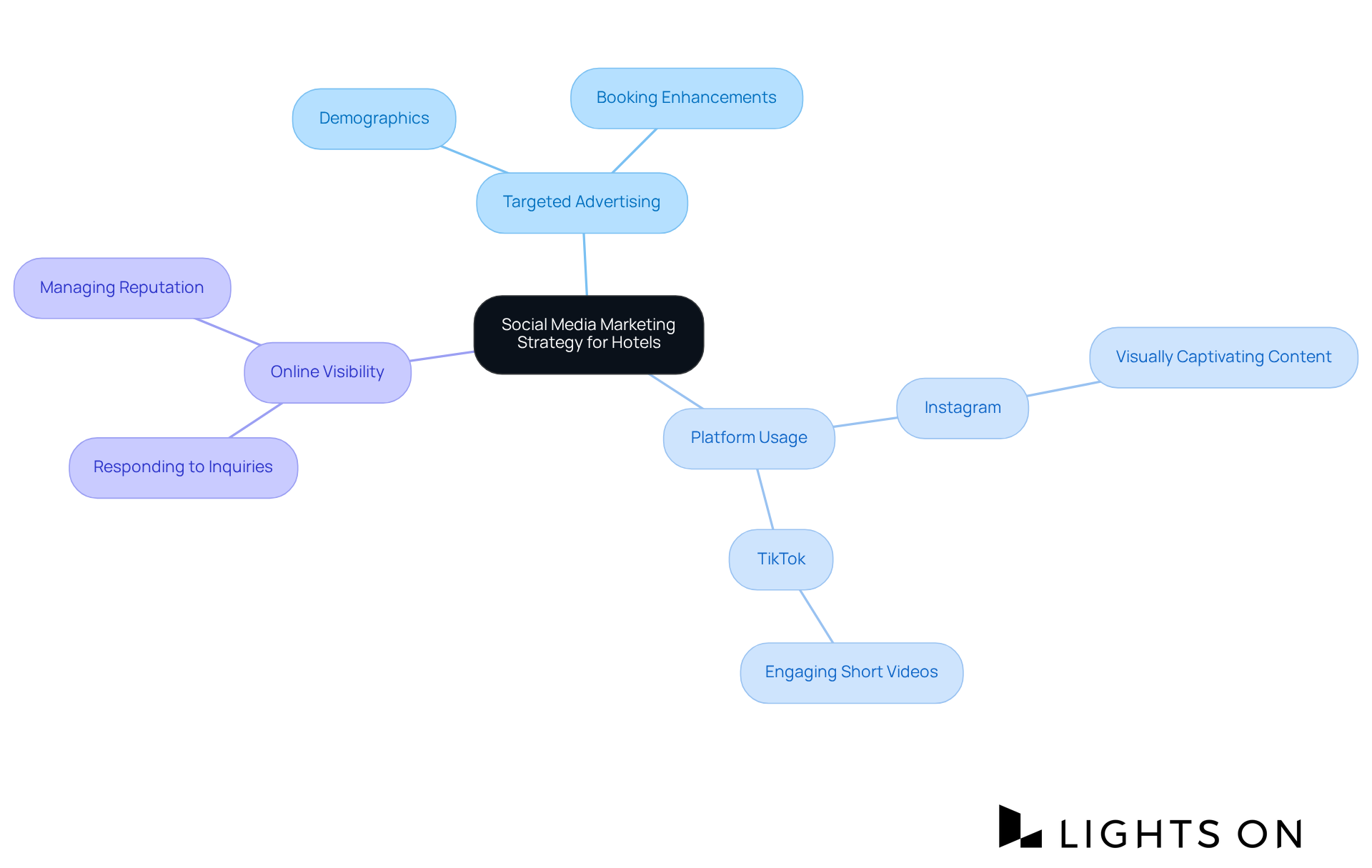
To create a customized online platform strategy, begin by clearly outlining your goals. Are you looking to boost brand awareness, drive direct bookings, or enhance customer engagement? Setting specific objectives is crucial; indeed, 75% of vacationers in 2023 noted that online platforms influenced their choice of travel destinations. Next, conduct a demographic analysis of your target audience, focusing on their interests and behaviors. This understanding will assist you in selecting the most effective platforms and types of content. For example, 80% of Gen Z travelers rely on social media for travel inspiration, and 34% of travelers were influenced by TikTok in 2022, making these platforms vital for reaching younger demographics.
Develop a publication calendar that outlines your posting schedule, detailing what to share, when, and on which platforms. An effective approach should incorporate a blend of promotional content, user-generated posts, and engaging elements that showcase your establishment's unique character. Utilizing , as consumers are 2.4 times more likely to perceive it as genuine compared to brand-created content.
Finally, allocate a budget for paid advertising to amplify your reach and engagement. It is advisable for hotels to set aside 10-25% of their digital marketing budget for various initiatives. With the typical conversion rate for online advertisements projected to be between 1-3%, investing in targeted campaigns can significantly enhance your visibility and increase bookings. By following these steps, you can develop a robust social media strategy that resonates with your audience and fulfills your marketing objectives.
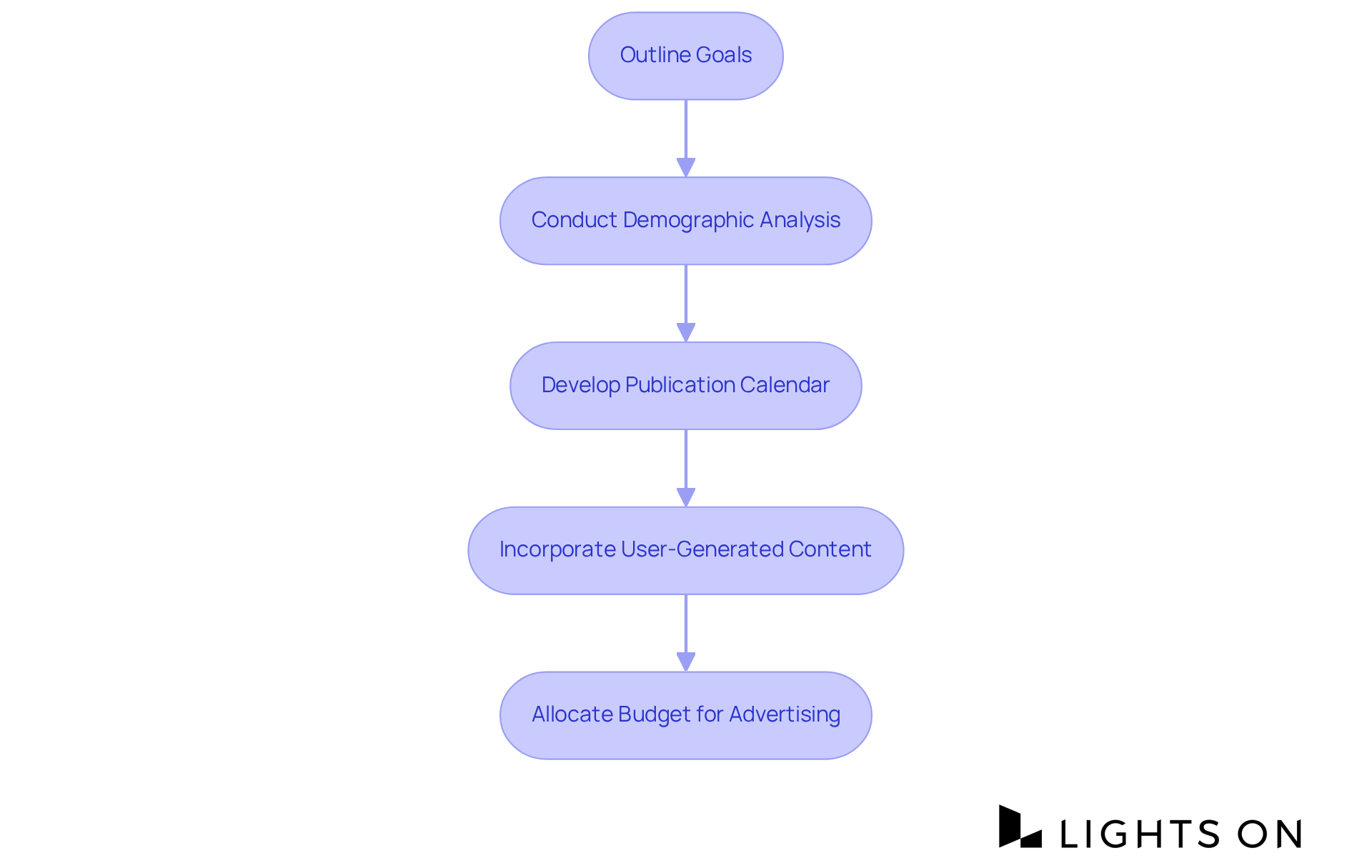
To create engaging content as part of a social media marketing strategy for hotels, it is essential to focus on:
Captivating images and videos that highlight your accommodation, local attractions, and events are key components of an effective social media marketing strategy for hotels to significantly attract potential guests.
Storytelling plays a crucial role in establishing emotional connections; sharing guest experiences or offering behind-the-scenes glimpses of your establishment can enhance this bond.
Furthermore, incorporating interactive elements such as polls, quizzes, and contests fosters participation and engagement, making the experience more dynamic.
In addition, promoting user-generated content by inviting visitors to share their experiences and tag your establishment is vital. This social media marketing strategy for hotels not only cultivates a sense of community but also provides authentic material that resonates with potential guests.
Notably, accommodations that leverage user-generated content can see bookings increase by 2.5 times compared to conventional branded material, underscoring the influence of genuine guest interactions in enhancing visibility and trustworthiness.
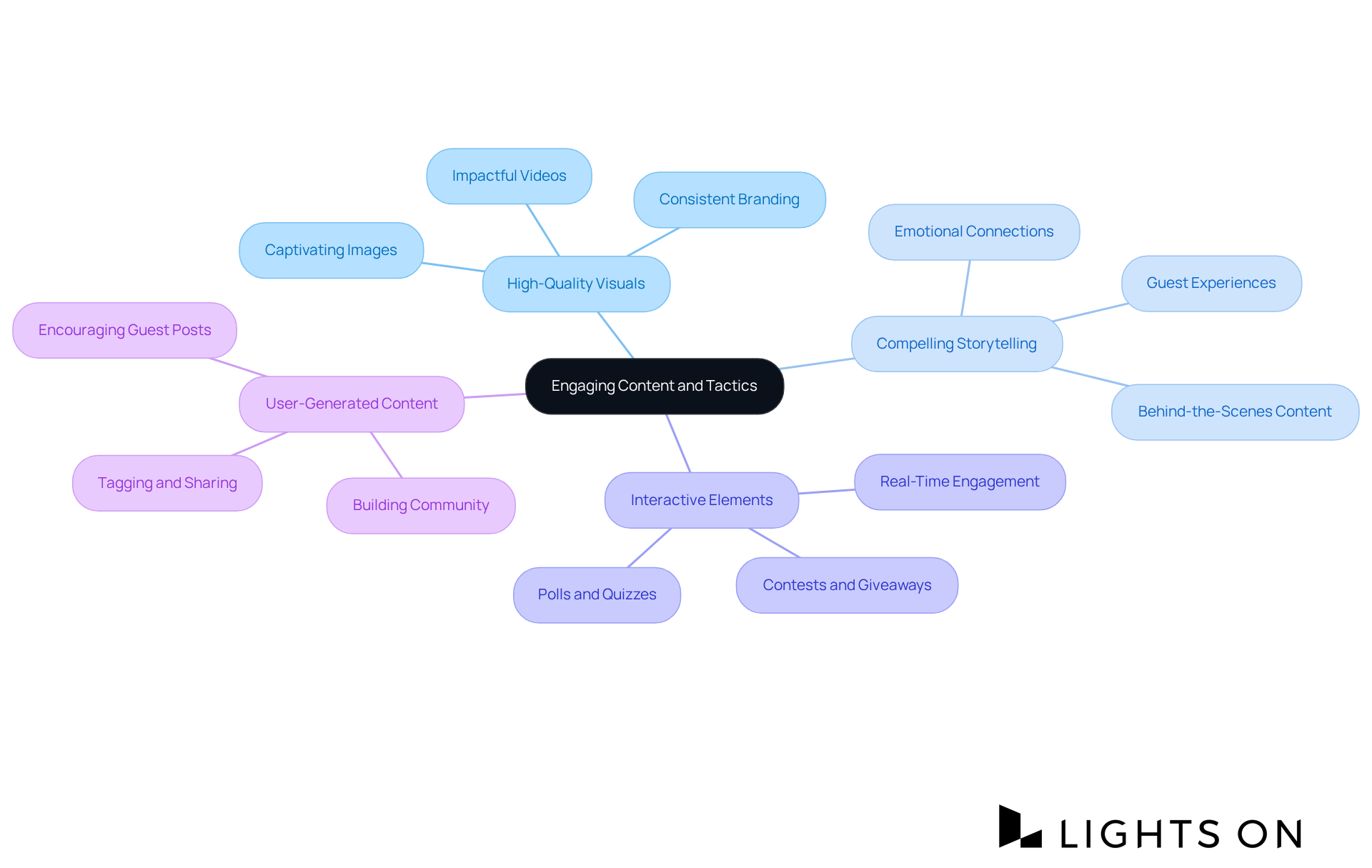
To effectively evaluate and optimize your social media marketing strategy for hotels, it is essential to regularly analyze analytics from each platform. Key metrics to monitor include:
These metrics provide valuable insights into which types of material resonate most with your audience, enabling you to refine your strategy accordingly. For instance, posting on Tuesdays and Wednesdays can yield better visibility on Instagram.
Furthermore, consider using targeted advertising to reach potential guests during peak booking times. Tools like Hootsuite and Sprout Social can assist in effectively.
Experimenting with various posting times, format types, and advertising strategies can reveal what produces the best results. Keeping updated on contemporary online trends and algorithm modifications is essential for sustaining a pertinent and efficient strategy.
Incorporating user-generated content can enhance engagement and authenticity, making your establishment more appealing to potential guests. Continuous improvement, guided by clear KPIs, is vital for maximizing your hotel's social media presence and driving direct bookings.
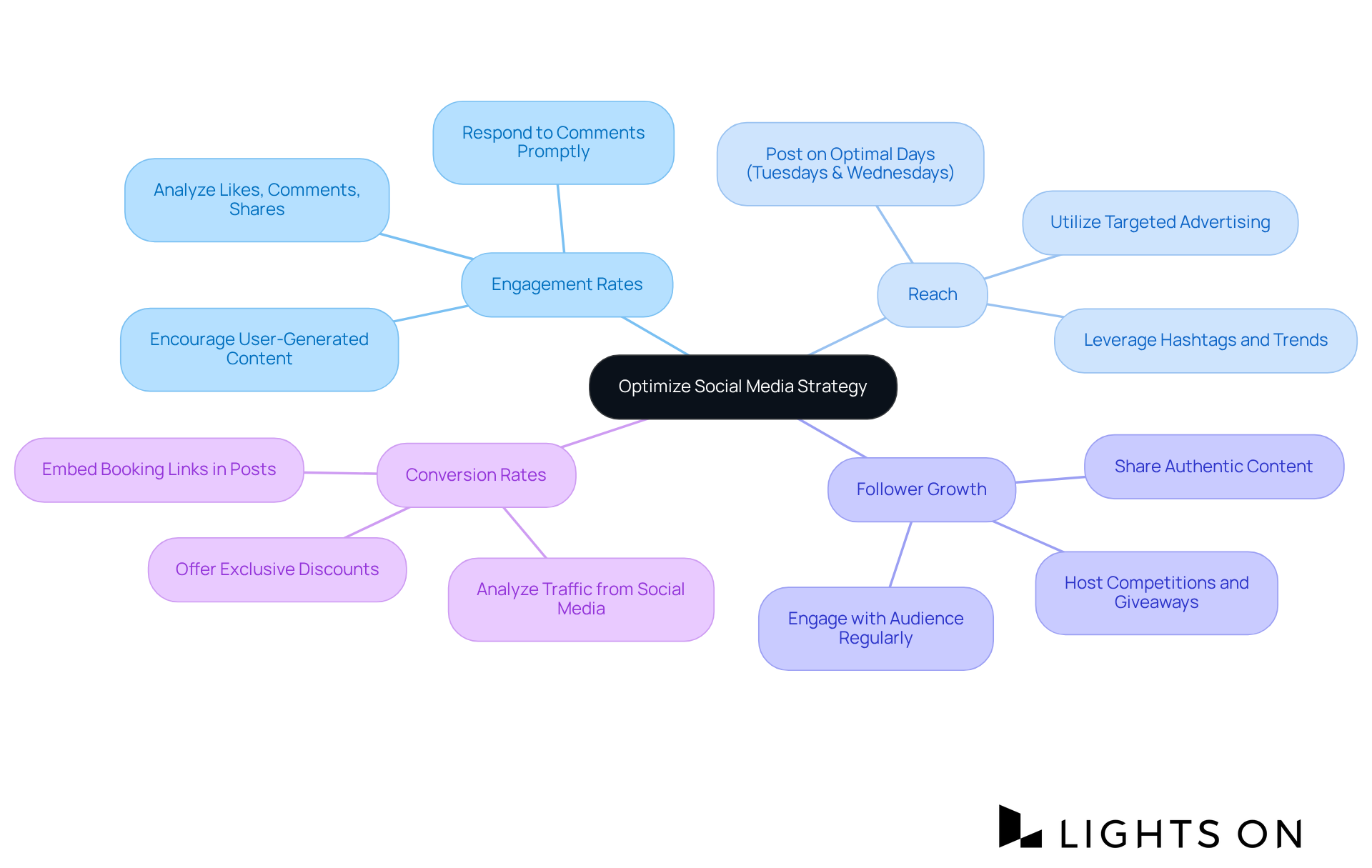
Crafting a robust social media marketing strategy is essential for hotels aiming to enhance their visibility and engage with potential guests in an increasingly digital landscape. By leveraging platforms like Instagram, Facebook, and TikTok, hotels can create tailored content that resonates with their target audience, driving both engagement and bookings. Understanding the unique characteristics of each platform and the demographics they attract allows hotels to refine their strategies effectively.
Throughout this discussion, key strategies have been highlighted, including:
Engaging content, such as high-quality visuals and interactive elements, fosters a sense of community and authenticity that can significantly influence travelers' decisions. Moreover, regular evaluation and optimization of social media efforts ensure that hotels remain relevant and responsive to changing consumer behaviors and preferences.
Ultimately, the significance of a well-executed social media marketing strategy cannot be overstated. As the hospitality industry continues to evolve, embracing innovative approaches and staying attuned to social media trends will be crucial for hotels aiming to thrive. By taking proactive steps to engage with audiences online, hotels can not only increase their bookings but also build lasting relationships with guests, ensuring long-term success in a competitive market.
What is the purpose of a social media marketing strategy for hotels?
The purpose of a social media marketing strategy for hotels is to enhance brand visibility, engage with guests, and boost bookings through platforms like Facebook, Instagram, and Twitter.
Which social media platforms are most effective for hotels and why?
Instagram is effective for showcasing visuals as 75% of its users are aged 18-24, while Facebook excels in promoting events and facilitating direct customer interactions.
How does authenticity play a role in social media marketing for hotels?
Authenticity is crucial as it fosters interaction and trust with potential guests. Effective online campaigns emphasize genuine engagement with the audience.
What is influencer marketing, and how does it benefit hotels?
Influencer marketing involves partnering with online creators to promote hotels. It generates significant revenue, with $6.50 earned for every dollar spent, and 88% of consumers influenced by these creators in their purchasing decisions.
How should hotels adapt their marketing strategies to new platforms like TikTok?
Hotels should integrate platforms like TikTok into their marketing strategies, as 75% of travelers report that online networks influence their choice of destination. Engaging content that tells a story can attract potential guests.
What are some key statistics regarding travelers' use of social media?
11% of travelers use online platforms for lodging research, and 75% are influenced by these platforms when selecting travel destinations.
What are the main components of an effective social media marketing strategy for hotels?
An effective strategy includes targeted advertising for specific demographics, leveraging visually captivating content on platforms like Instagram and TikTok, and actively managing online reputation by responding to inquiries.
Why is it important for hotels to invest in social media marketing?
Investing in social media marketing is vital for capturing leads throughout the sales funnel and converting prospects into paying customers, ultimately increasing bookings.
Transform your group booking strategies with Lights On and watch your occupancy soar.